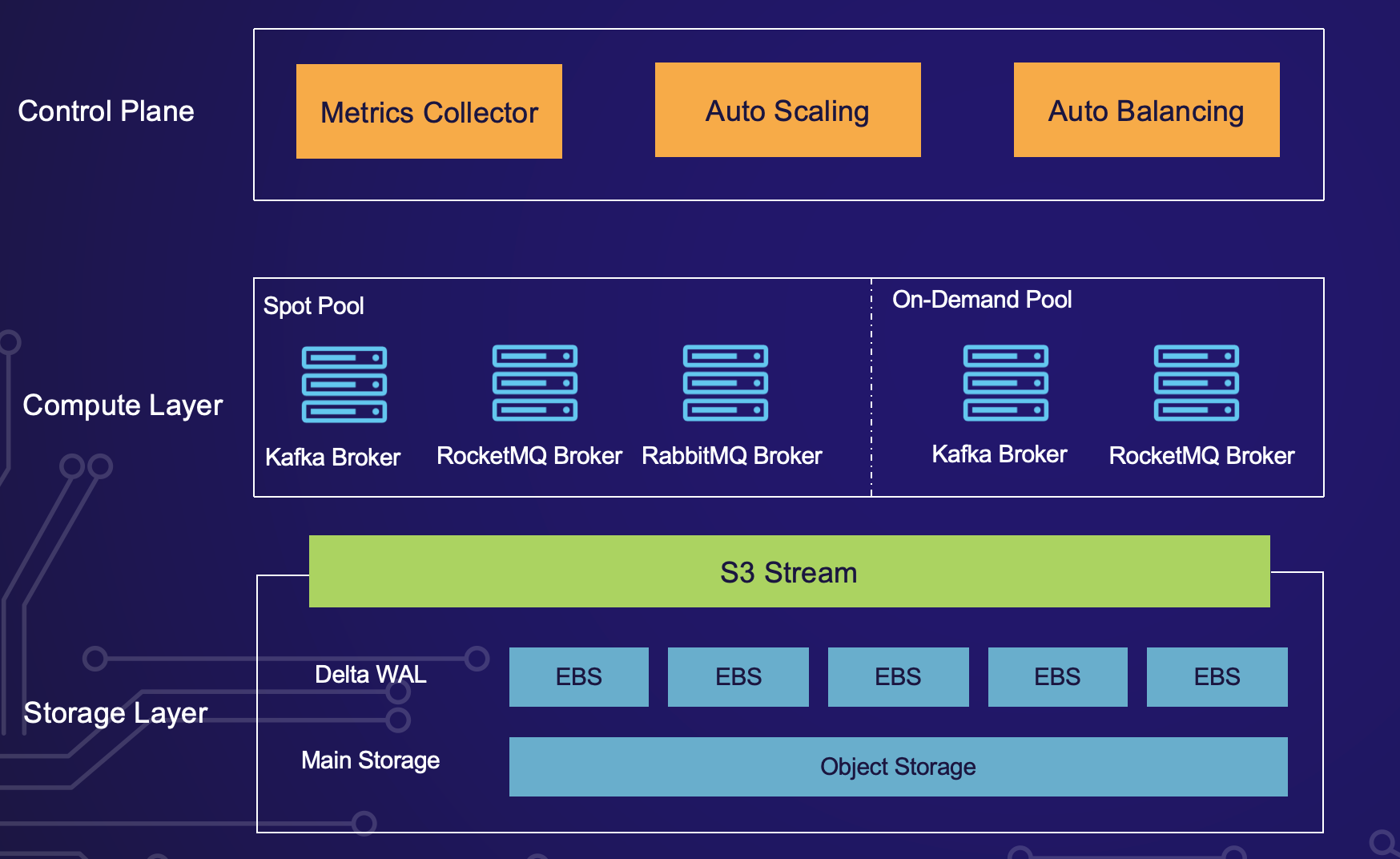What Is AutoMQ Cloud
Overview
AutoMQ Cloud is a cutting-edge, fully-managed Kafka cloud service provided by AutoMQ CO., LTD. It allows enterprise developers to seamlessly build and operate event stream processing applications in a public cloud setting, eliminating the complexities of cluster management.
AutoMQ Voice is fully compatible with the open-source Apache Kafka® and offers substantial enhancements and improvements over the Community Edition, particularly in high-availability disaster recovery architecture, scalability, and enterprise-level operational observability.

Core Advantages
AutoMQ Cloud presents the following benefits:
Pay-as-you-go, with an Immediate 50% Reduction in Cloud Bills
AutoMQ's innovative cloud-native architecture takes full advantage of Object storage and cloud-based elastic computing resources, delivering substantial cost savings compared to Apache Kafka® and other competitive solutions.
By subscribing to AutoMQ Cloud, customers can access it on-demand, pay-as-they-go, and benefit from an immediate 50% reduction in cloud bills.
Fully Managed and Maintenance-free, with SLA Guarantees
AutoMQ Cloud, provided by the AutoMQ team, is a fully managed cloud service designed specifically for public cloud environments. Users can activate it with just one click, eliminating concerns about cluster deployment, modifications, or maintenance. The AutoMQ team provides round-the-clock support and guarantees service level agreements (SLAs).
Supports BYOC, with Resources Deployed in the User's VPC, Eliminating the Need for Cross-network Data Transfers
In addition to the traditional SaaS model, AutoMQ Cloud also offers a BYOC option, deploying cloud resources directly within the user's VPC. This configuration enables seamless access to AutoMQ without requiring cross-network connections, and allows users to benefit from existing discounts on cloud account resources.
Enterprise Capabilities Ready Out-of-the-box
Built on the Community Edition, AutoMQ Cloud incorporates several enterprise-grade features such as automatic scaling, instant partition reassignment, and comprehensive system observability. These services are available immediately upon activation, with no additional development required.
Natively Supports Multi-cloud
AutoMQ's cloud-native architecture, based entirely on public cloud components like object storage and virtual machines, facilitates multi-cloud deployments. Enterprises can effortlessly activate and utilize AutoMQ Cloud across various major cloud platforms.
Selecting Service Versions
AutoMQ provides two tailored service options for enterprise customers: AutoMQ Cloud and AutoMQ Enterprise. AutoMQ Cloud is a fully managed cloud service, offered in both SaaS and BYOC models by the AutoMQ team; AutoMQ Enterprise, on the other hand, is aimed at IDC private deployments and available as Enterprise Edition software.
Enterprises can consult the following table to determine the most appropriate service version.
| Comparison Item | AutoMQ Cloud | AutoMQ Cloud | AutoMQ Enterprise |
|---|---|---|---|
| Service Model | SaaS [1] | BYOC[2] | On-premises software[3] |
| Deployment Environment | Primarily for public cloud environments, supporting major cloud providers:
| Primarily for public cloud environments, supporting major cloud providers:
| Primarily for IDC environments, supporting the following storage technologies:
|
| Resource Ownership | IaaS resources owned by AutoMQ cloud account | IaaS resources owned by user's cloud account | IaaS resources owned by the user |
| Data Sovereignty | 100% secure, trusted AutoMQ cloud account management | 100% private, data remains within user's VPC | 100% private, data remains within user's private network |
| Operations Mode | One-click activation through cloud marketplaces and official websites, covering scenarios such as:
| One-click activation through cloud marketplaces and official websites, covering scenarios such as:
| All operations are performed by the customer, while the AutoMQ tech team provides remote technical support. |
| Payment Methods |
|
|
|
| Cost Structure | Software service fee (pricing includes cloud resources) |
|
|
| Technical Support |
|
|
|
| Applicable Scenarios | Default option for public cloud customers | For certain public cloud customers who want to reuse IaaS discounts, keep data within the VPC, and authorize operations. | Suitable for financial and government-enterprise customers who require data sovereignty, completely isolated environments, and offline IDCs. |
Annotations:
[1] Indicates that both the control plane and data plane of AutoMQ Cloud are deployed under the customer's cloud account VPC, providing fully managed services.
[2] Indicates that both the control plane and data plane of AutoMQ Cloud are deployed under the AutoMQ company's cloud account VPC, connecting with the customer's VPC through VPC PrivateLink or VPC Peering.
[3] refers to deploying both the control plane and data stands of AutoMQ Enterprise entirely within a customer's private data center, where the customer is responsible for maintenance and operations, while AutoMQ CO. provides ongoing technical support and updates.
[4] In the BYOC model, during the operation of AutoMQ Server, the generated logs, metrics, and diagnostic data are stored in a separate Object storage Bucket. The customer needs to grant cross-account access to this Bucket to the AutoMQ team's main account. AutoMQ's operations platform continuously analyzes the customer's cluster logs and metrics, with AutoMQ's dedicated R&D team ensuring the stable operation of the customer's cluster from behind the scenes.
[5] AutoMQ Cloud features automatic failure recovery, constantly monitoring cluster performance metrics and automatically isolating any nodes that exhibit abnormalities. This allows for fault recovery before the issues affect the application, typically completed within minutes. Following this, AutoMQ's engineering team will conduct a backend analysis of the fault cause.
Related Documents
- Quickly Experience AutoMQ Cloud: Getting Started▸